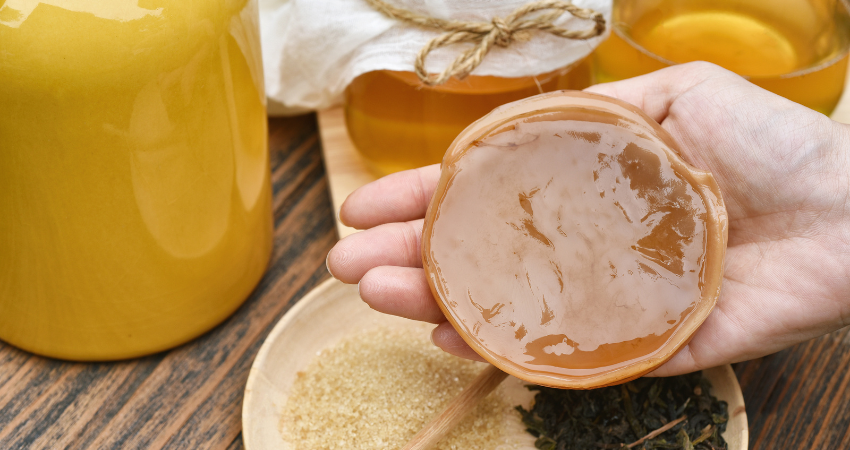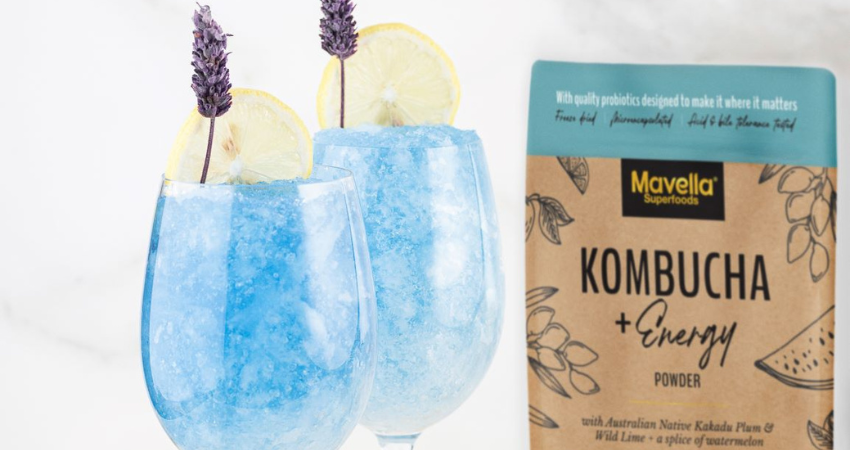If you haven’t already jumped on the kombucha train, there’s still time! We are absolutely in love with kombucha. Let’s look at a few reasons why.
Kombucha is a fermented beverage made from tea and bacteria. It has been around since the early 20th century in Asia. After World War II, kombucha remedy was introduced to the United States, where it became popular with health food enthusiasts. Today, it's available in most supermarkets and natural foods stores. Kombucha is low in calories (about 35 calories per 8 oz serving) and contains no fat or cholesterol. It is also high in B vitamins and antioxidants that may help protect against heart disease and cancer
Kombucha (pronounced Kom-bu-cha) is a natural drink made from fermented black or green tea. The tea is brewed along with sugar and the very important scoby culture (Symbiotic Culture of Yeast and Bacteria). If you have never seen a scoby before, they kind of look of like those chicken filet sticky bras, which sounds gross, but they are a little power house of good bacteria and good yeast. The drink is left to sit from anywhere between 7-21 days, during which the beneficial microbes feast on the sugar and grow in number. As a result, the end product contains very little to no sugar.

Kombucha is rich in beneficial probiotics, or helpful bacteria, also known as "good" or "friendly" bacteria because they work to keep your body healthy and prevent harmful germs from taking over. Probiotics are live bacteria that can help keep your digestive system and immune system in good working order. Your gut contains trillions of microbes (bacteria), but not all of them are good for you; some can cause illness instead. Probiotics like those found in kombucha can balance out the bad bacteria while providing many health benefits to your digestive system and immune system.
Probiotics may improve digestion by making it easier for food to pass through your intestines and helping to break down nutrients so they can be absorbed by the body more easily. In addition, research supports evidence that probiotics may help reduce bloating after eating too much fibre; relieve diarrhea caused by antibiotics; ease constipation caused by antibiotics; improve lactose intolerance symptoms (since fermented dairy products like yogurt typically contain smaller amounts of lactose); boost immunity against infections like colds; ease eczema symptoms such as redness, dry patches and itching due to its anti inflammatory properties.
Benefits of kombucha:
Kombucha is rich in beneficial probiotics. Probiotics have many health benefits and may aid digestion, lower cholesterol levels, increase energy levels and help with weight loss. They also support gut health by boosting immunity and improving nutrient absorption.
Kombucha can improve your health in other ways too: it may boost the immune system by increasing natural killer cells that attack harmful microorganisms; it can reduce inflammation throughout the body; it may protect against cancer; it may promote cardiovascular health through its ability to lower cholesterol levels and blood pressure; it has anti aging properties that prevent wrinkles from forming around the eyes; kombucha improves skin elasticity by stimulating collagen production which helps to firm up sagging skin on the face; kombucha promotes hair growth because of its high vitamin C content which stimulates keratin production inside each follicle so that new hairs can be made thicker than they would otherwise be.
The truth is, all kombuchas are provide gut health benefit, however the best kombucha for gut health is the Mavella Superfood Kombucha Gut. Made with added prebiotics and herbs to rev up digestion and feed your good bacteria, it contains superfoods such as ginger, turmeric extract, black pepper, plus prebiotics (inulin & F.O.S), Australian green banana starch & acacia fibre) that feed the good bacteria to allow them to grow. With apple cider vinegar mother to support digestive function, this Australian kombucha contains 2 Billion CFU probiotics per serve
Fermented herbs and foods and good for your gut, because they contain lots of friendly bacteria. Bacteria in your gut are what help to make your digestive enzymes, which are responsible for breaking down and absorbing your food. The result of better digestion and gut health is reduced bloating following a meal, reduced constipation and/or diarrhoea (loose water stools are usually an indication of bacterial imbalance), increased energy, clearer skin… the list goes on. Basically, if you have a healthy gut, many other areas of your health will be positively affected.
These days you will find various kombucha flavours, adding more excitement to these already tasty drinks. Mavella kombucha powder comes in 3 different flavours, including:
First of all, kombucha is unpasteurised and contains alcohol. That's a bit of a problem if you're pregnant, because it's not recommended to drink alcohol during pregnancy. Why? Well, there have been studies that have shown that drinking alcohol can lead to low birth weight and miscarriage. Additionally, drinking too much during pregnancy can affect the development of your baby's brain and other organs.
So...how safe is kombucha in pregnancy? It's not safe to drink alcohol during pregnancy, and kombucha contains alcohol. But what about the probiotics?
It's true that there are probiotic benefits to kombucha, and some women want to continue drinking kombucha during pregnancy for the health benefits. However, it might not be worth it because of the alcohol risk. There are also other alternatives such as organic probiotic, which are safe to be consumed during pregnancy or breastfeeding. For more information, refer to our previous blog on probiotics. In any case, if you are pregnant or breastfeeding, please seek advice from your health care practitioner before consuming kombucha.
No, kombucha does not contain caffeine because it is made from black or green tea. However, there are small amounts of naturally occurring caffeine in the tea used to make kombucha. Kombucha is not a substitute for coffee or tea since it contains less than half the amount of naturally occurring caffeine as well as being very low on sugar (0-2 grams) and calories (3-7 per ounce). Mavella Superfoods Kombucha Energy is made with added guarana & green coffee for a natural caffeine kick.

You can get drunk on kombucha. That’s a fact. But you have to drink a lot of it for that to happen - and even then, the fungi and bacteria in the tea will be able to process the alcohol quickly and safely. In fact, there are benefits associated with drinking kombucha:
Kombucha is made with tea and sugar, which are both gluten free ingredients. However, some kombucha brands may use barley or wheat as flavouring or a preservative (such as yeast extract). If you're sensitive to gluten, it's important to check the ingredient list on any commercial kombucha you buy.
Some people who suffer from celiac disease report that they feel better when drinking kombucha because of its probiotic content; however, this is not always the case for everyone. Kombucha can also contain traces of gluten from contamination during brewing if there are any cross-contaminants in your kitchen such as oats or malt vinegar that could taint your batch during fermentation - though this isn't common if you're following strict hygiene protocols when preparing your brews at home! Mavella Superfoods kombucha is gluten free.
Drinking kombucha in moderation is safe for most people. Kombucha is a fermented tea, meaning it contains small amounts of alcohol. The low level of alcohol in kombucha doesn't cause many problems for most people, but it can be risky for those who have a sensitivity to alcohol or addiction issues.
You should talk to your doctor before starting to drink kombucha if:
.png)
The short answer is, anyone! The long answer is:
While there really is no rule, if you have never consumed fermented foods before, and you are prone to digestive symptoms such as bloating and flatulence, it is best to start off slow, as too many bacteria if you’re not used to it can make you slightly windy. Most flavoured kombucha's sold in small bottles are diluted, so you can drink them as you would a can of soft drink for example. You can also buy concentrated kombucha in larger bottles, in which case between 20-60ml daily is enough. If you choose to drink it this way, enjoying it as a shot in the morning will help to cleanse your system and give your digestion a kick start for the day. Kombucha is not recommended for children under the age of 5, and should be avoided by people with a history of liver problems or if you are pregnant or breastfeeding. Those who are sensitive to caffeine should also avoid kombucha.
While kombucha is generally safe to drink, it can cause side effects in some people. The most common side effects of drinking kombucha are nausea, headaches and dizziness. These symptoms may be caused by caffeine or alcohol in the drink. If you experience any of these symptoms when you drink kombucha, make sure to stop drinking the beverage immediately and consult your doctor if they persist after several days of discontinuing consumption.
Kombucha should also be avoided by pregnant women because there is insufficient information regarding its safety during pregnancy or breastfeeding.
Kombucha is a great alternative to coffee and other caffeinated drinks. It’s also high in B vitamins, which can improve your overall mood and energy. Drinking kombucha in moderation is safe for most people, but if you have a medical condition, talk with your doctor before trying this beverage or any other new food or supplement for the first time.